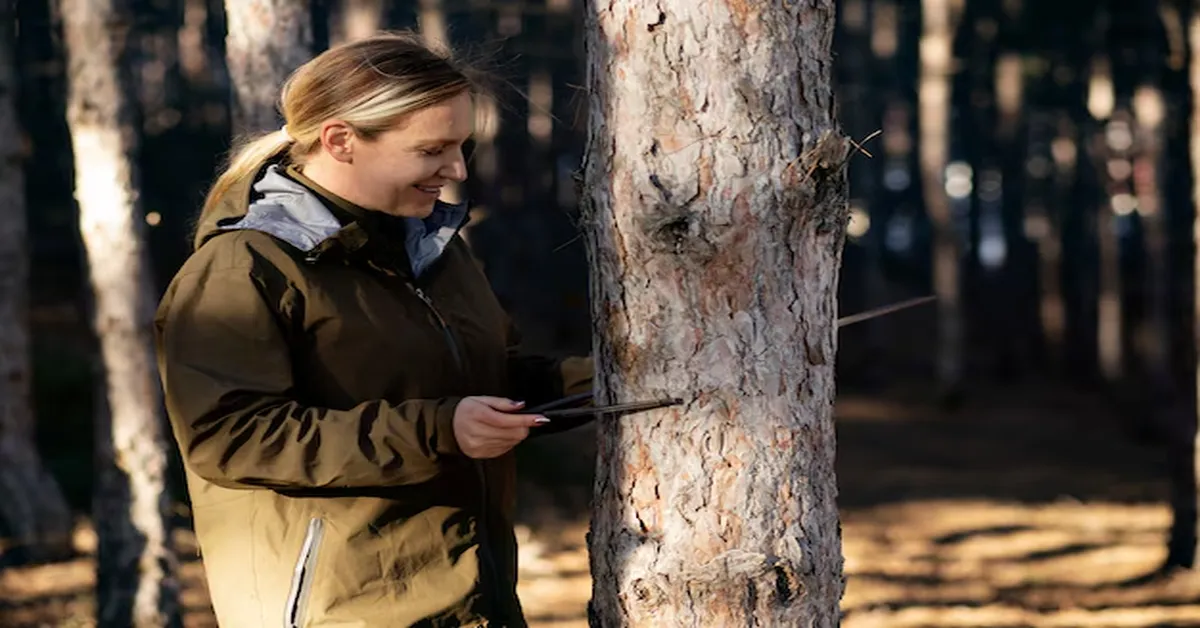Have you ever wandered through your local forest and wondered about the intricate web of life that flourishes beneath the canopy? Forests are not just beautiful landscapes; they are vital ecosystems brimming with biodiversity, carbon storage, and recreational opportunities (10 Questions For an Interview With A local Forester). Behind this natural wonder lies a dedicated group of professionals working tirelessly to protect and manage these resources.
If you’re considering a career in forestry or simply want to deepen your understanding of how our forests are managed, it’s essential to grasp what goes on behind the scenes. This journey begins with asking the right questions during interviews for roles like forest managers and foresters. Whether you’re gearing up for an interview yourself or curious about what these experts face daily, we’ve compiled 10 crucial questions that will change how you view your local forest.
From environmental protection strategies to unique challenges faced by forestry technicians, this list is designed not only to prepare future applicants but also to enlighten anyone passionate about preserving our green spaces. Let’s delve into insights that might just transform your perspective on one of nature’s most precious resources!
Interview Questions To Expect for Forest Manager and Forester Roles
When interviewing for roles as a forest manager or forester, expect questions that assess both your technical knowledge and practical experience. These positions require a deep understanding of ecology, forest management practices, and the regulatory frameworks governing land use.
One common question might focus on sustainable forestry practices. Interviewers often want to know how you would balance economic interests with environmental sustainability (10 Questions For an Interview With A local Forester). Your ability to articulate strategies for managed timber harvests while preserving wildlife habitats can set you apart.
Another important area is your familiarity with local flora and fauna. You may be asked about specific species in your region and their ecological significance. This not only tests your knowledge but also demonstrates your commitment to biodiversity conservation.
Moreover, interviewers frequently explore conflict resolution skills through situational questions. They might ask how you’d handle disagreements between stakeholders—such as logging companies and environmental groups—over land-use decisions. Your response should reflect diplomacy alongside an adherence to ethical considerations.
Technical proficiency is another focal point during these interviews. Candidates are often queried about tools or software they have used for data collection or analysis, like Geographic Information Systems (GIS). Being well-versed in technology shows you’re prepared for modern challenges in forestry management.
Communication abilities play a significant role too; interviewers may request examples of when you’ve had to explain complex scientific concepts to non-specialists or community members effectively. Demonstrating strong communication skills highlights your capability to educate others about critical issues related to forests.
Expect inquiries regarding past projects you’ve worked on with measurable outcomes—be it reforestation efforts or habitat restoration initiatives. Discussing tangible results conveys an understanding of both the impact of forestry work and its importance within broader environmental contexts.
Read: Crypto 30x.com Safe? Security Measures in Currency Trading
Insights on Environmental Protection Forester Interview Questions
When preparing for an interview as an Environmental Protection Forester, it’s crucial to understand the specific questions you might face. Interviewers often focus on your knowledge of sustainable practices and regulations related to forestry (10 Questions For an Interview With A local Forester). Expect inquiries that gauge your understanding of environmental policies at local, state, and federal levels.
One common question revolves around the principles of conservation. Interviewers may ask how you would balance ecological health with human activities such as logging or tourism. Your response should reflect a nuanced understanding of both perspectives while emphasizing strategies that promote sustainability.
Another area examiners delve into is conflict resolution within various stakeholders involved in forest management (10 Questions For an Interview With A local Forester). You might be asked about past experiences where you’ve mediated disputes among landowners, government agencies, or conservation groups. Highlighting real-life examples will demonstrate your problem-solving skills and ability to foster collaboration.
Knowledge about current environmental issues is also paramount during interviews for this role. Be prepared to discuss challenges like climate change impacts on forests and biodiversity loss due to invasive species or habitat destruction. Conveying awareness shows you’re not only informed but passionate about addressing these pressing concerns.
Technical expertise in tools and technologies used for monitoring forests can set you apart from other candidates too (10 Questions For an Interview With A local Forester). Questions may probe your familiarity with Geographic Information Systems (GIS) or remote sensing equipment used in data collection and analysis for forest health assessments.
Moreover, interviewers may explore your commitment to community engagement initiatives tied to forestry projects—especially regarding education on sustainability practices among local populations. Sharing ideas about outreach programs could showcase your proactive approach toward fostering public involvement in conservation efforts.
Expect situational questions asking how you’d handle emergencies like wildfires or pest outbreaks affecting local ecosystems. These scenarios test not just technical know-how but also decisiveness under pressure—a valuable trait in any forester dedicated to protecting our natural resources.
Unique Interview Questions for Forestry Technicians
When preparing for an interview as a forestry technician, candidates can expect unique questions tailored to the specific skills and experiences relevant to this role. These questions are designed to assess practical knowledge and problem-solving abilities in real-world scenarios.
One common question may focus on your familiarity with forest management software. Interviewers might ask you to describe any programs you’ve used before. They want insight into your technical skills, especially in data collection and analysis pertaining to tree health or wildlife habitats.
Another area of inquiry often revolves around fieldwork experience. You could be asked about the most challenging situation you faced while working outdoors. Sharing how you approached obstacles—whether they were environmental conditions or logistical issues—can highlight your ability to think critically under pressure.
Understanding local ecosystems is vital for a forestry technician, so expect inquiries about plant identification. Interviewers may present images or descriptions of various species found in the region, asking you which ones are native versus invasive. Your ability to differentiate these plants shows not only expertise but also an understanding of ecological balance.
Safety protocols will likely come up during the discussion as well. Questions regarding handling equipment safely or responding effectively in emergencies provide insights into how prepared you are for unforeseen situations at job sites.
In addition, interviewers might seek examples of teamwork within past projects. Collaborative work is essential in forestry; sharing instances where communication led to successful outcomes can demonstrate your interpersonal skills and adaptability within diverse team environments.
Consider that passion for conservation will resonate during interviews too. Expect philosophical questions about sustainable practices in forest management and how they align with personal values. These inquiries help reveal not just qualifications but also commitment to preserving natural resources for future generations.
Exploring Different Career Paths in Forestry and Their Interview Questions
Forestry offers a diverse range of career paths, each with unique responsibilities and challenges. Understanding these roles can help you prepare for interviews effectively.
One common position is that of a forest manager. A forest manager oversees the daily operations within wooded areas, ensuring sustainable practices are upheld. Interview questions may focus on your knowledge of silviculture techniques or experience in resource management.
Another exciting role is that of an environmental protection forester. These professionals work closely with government regulations to safeguard natural resources. Expect questions about your understanding of environmental laws and how you’ve previously addressed compliance issues.
For those drawn to research, consider becoming a forestry researcher or scientist. This role requires strong analytical skills and the ability to interpret complex data sets about ecosystems. Interviewers might ask how you’ve utilized statistical methods in past projects or what trends you foresee affecting forestry in the coming years.
If you’re more technically inclined, exploring positions as a forestry technician could be ideal. Technicians assist with fieldwork and data collection while supporting various forestry programs. Be prepared for inquiries regarding specific technologies or methodologies you’ve employed during previous jobs or internships.
Wildlife biologists working within forests also play critical roles by studying animal populations and their habitats. When interviewing for this position, expect scenario-based questions where you’ll need to demonstrate your problem-solving abilities related to wildlife conservation efforts.
Urban foresters focus on managing trees in city landscapes—bridging nature with urban development! Questions here may revolve around community engagement strategies or best practices for maintaining tree health amid pollution challenges.
Each career path presents its own set of interview expectations based on job responsibilities and industry demands, so tailoring your preparation accordingly is essential.
Read: Classics to New Hits: You Can Find on Unblocked Games 66 EZ
Conclusion
Understanding the intricacies of forestry can transform your perspective on local ecosystems. The questions posed during an interview reveal not just the skills required, but also the profound impact foresters have on environmental stewardship.
As you navigate through conversations with professionals in this field, each question opens a window into their daily challenges and victories. Whether it’s about managing resources or protecting wildlife habitats, these insights reflect the crucial role they play in maintaining ecological balance.
Foresters are often at the forefront of dealing with climate change and biodiversity loss. Their expertise is vital for developing sustainable practices that benefit both nature and communities. This dual focus creates pathways for innovation in conservation efforts.
The variety of roles within forestry—from managers to technicians—means diverse experiences exist within the profession. Each position requires specific knowledge and skill sets, making every interview unique and revealing.
Moreover, exploring different career paths allows individuals to consider where their passions align most closely with professional opportunities available in forestry. It’s inspiring to see how various backgrounds contribute uniquely to forest management strategies.
These discussions shed light on pressing issues such as habitat preservation and resource management techniques critical for future generations’ quality of life. Engaging with foresters helps demystify these topics while fostering respect for our natural surroundings.
Acknowledging what goes into caring for forests provides a deeper appreciation of nature’s complexity—and highlights why supporting these professionals matters today more than ever.
FAQs
Understanding the intricacies of forestry can feel overwhelming. Here are some frequently asked questions that can clarify common concerns and curiosities related to local forests and their management.
1. What is the primary role of a forester?
Foresters manage forested lands to ensure sustainable practices while balancing ecological health, economic viability, and social benefits. They oversee various activities such as timber harvesting, conservation efforts, and wildlife habitat protection.
2. How do I prepare for an interview with a local forester?
Researching specific environmental issues in your area is crucial. Familiarize yourself with local fauna and flora, recent projects by the forestry department, or significant ecological challenges facing your region. Prepare thoughtful questions about these topics to showcase your knowledge during the interview.
3. Are there different specializations within forestry careers?
Yes! Forestry offers diverse career paths including urban forestry, conservation science, agroforestry, and wildfire management among others. Each specialization has unique responsibilities leading to varied interview questions focusing on those areas.
4. Why are interviews important for roles in forestry?
Interviews play a pivotal role because they allow employers to assess candidates’ understanding of complex environmental regulations as well as their problem-solving skills when faced with real-world scenarios affecting forests.
5. What impact does climate change have on forest management jobs?
Climate change significantly influences forest ecosystems leading to shifts in species distribution and increased risks like wildfires or pest infestations. Professionals must adapt strategies accordingly which makes it essential for job applicants to be knowledgeable about current trends impacting forestry practices today.
By exploring these questions further you will not only deepen your understanding but also enhance how you perceive the vital work being done by those committed to nurturing our precious natural resources.





